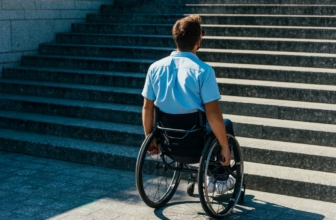A sad reality of today’s world is that ableism runs rampant throughout society and many places of employment. The news that a Deaf man losing a job he was offered after he revealed to his new employer that he was Deaf and would need a sign language interpreter is just one example of how many individuals living with disabilities face barriers not only in trying to secure employment but also in being a part of something.
And just because ableism exists, it doesn’t mean that the people who are practicing it are immune to being called out for their discrimination against disabled people.
Take, for example, the recent outcry over how the reality show Big Brother has treated their first Deaf contestant. They have tried to provide accommodations but, unfortunately, these accommodations only implemented their belief that the contestant should be able to hear. For clarification, this contestant is technically “hard of hearing” because he wears hearing aids which help him to hear a little.
This individual has a hearing disability, yet he is not receiving the same kind of accommodations a person with a hearing disability should receive. The outcry reached its peak recently when the contestant was forced to participate in a game that included an audio challenge. Viewers of the show sensitive to this contestant’s disability called the show out on social media, decrying that it was unfair to make a person with a hearing disability participate in a challenge that required him to hear.
This is just one example of how businesses, TV shows, and even public performances such as concerts will try to include someone with a disability to show that they are inclusive, but they end up falling short because they don’t really seem to understand the full extent of what it means to be inclusive. It’s not enough that they have someone on board who has a disability; they must ensure that they are treating this person with a disability correctly (meaning, not discriminating against them), providing accommodations, and avoiding ableist language.
The ”ableist language” has a way of creeping in, no matter what efforts a company may take to shine a positive light on someone with a disability.
Take, for example, the case of Cora Reilly, an author who was accused of ableism when she included the word “bound” in her book’s blurb: “Since a car accident as a child, Emma Mancini is bound to a wheelchair.” A writer reporting a follow-up story about this for The Mary Sue cited it as an ableist slur, and rightfully so.
But here’s my question: How come nobody caught it? How many people failed to notice this slur and let the book progress to production?
I was asking myself that same question recently when I came across an advertisement for a new novel. I would have been grateful to the publishing company that released the ad to their subscribers for publishing a book with a main character in a wheelchair had the author not described his character as “bound to a wheelchair.”
All I could see in that sentence was “bound.”
Not wheelchair. Not Navy SEAL. Just the word “bound.” And it left a sour taste in my mouth. I called them out about it on Twitter with a picture of the ad, but they did not respond. Is it possible that someone screwed up? That not one person on their entire staff did not realize how ableist that sounded?
The sad truth is, not everybody realizes that they are being ableist when they are being ableist. When I saw a post on Instagram by the wheelchair user rockstar, Disabled Eliza, saying that it was not appropriate to ask people in a wheelchair, “What happened?” I was appalled that people were doing this. I was flabbergasted that people thought it was OK to ask someone in a wheelchair such a question.
I was later informed that doing this was ableist. Perhaps the people doing this kind of thing did not realize that they were acting ableist – or that they were now part of a group termed “Street Ableists.”
Street Ableist is a term I came across in one writer’s piece on a site called “The Once and Future Cripple.” The author of this piece cited ableist language in J.K. Rowling’s book, The Ink Black Heart. In the novel, the character, who has a disability that requires the assistance of a cane, pretty accurately describes what Street Ableism is when sharing their fear of people on the street staring at them and asking about why they must use a cane.
The problem, though, the big Elephant in the Room, is that many people do not understand how they are being ableist when they are being ableist. And this is why ableism is so harmful. For years, we have tolerated this kind of language, so much so that a lot of people started to see it as a part of normal conversation. Thanks to more people speaking out against such language, however, society can begin to make a dramatic shift towards more inclusive language.
The National Center on Disability and Journalism has released guidelines on how to avoid ableist language in writing. It provides this definition of ableist language: “‘Ableism' refers to discrimination and social prejudice against people with disabilities. Ableism comes in all forms, from overt prejudice to more subtle microaggressions.” In essence, it is discrimination towards an individual with a disability. Social prejudices can be found in statements such as “he did this AMAZING THING despite being blind!” and “it has fallen on deaf ears.” Or there's the more common “I'm so OCD about that!” These are all examples of ableist phrasing which are a huge part of common language. They are disrespectful and discriminating to those who actually are sight-impaired or who have OCD. Perhaps more people would be better off educating themselves on what is and is not ableist language and I think that this site is a good place to start.
Becoming aware of just how ableist common phrases and words are when it comes to disabilities can help more people understand the importance of creating an inclusive dialogue with others. And, let us hope, more inclusive actions that are thoroughly inclusive.
Don’t be the TV show that includes a Deaf person just so you can look like you are inclusive. Instead, practice inclusivity all the way by providing accommodations to the person with a disability, omit ableist language from your dialogue, and get rid of the negative stereotypes associated with the disability. If you want to be inclusive, be inclusive all the way, and not just in a way that is actually a poor attempt to look good.
Image via Deposit Photos







